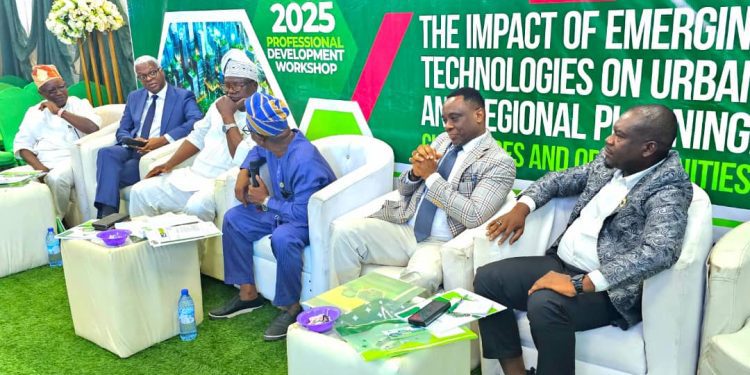![]()
Abeokuta, the Ogun State capital, recently hosted a convergence of professionals and stakeholders in the built environment, as experts in urban planning, estate development, and government representatives met for a two-day workshop to address pressing challenges threatening the sustainability and equity of urban development in Lagos and Ogun states.
Organised by the Association of Town Planning Consultants of Nigeria (ATOPCON), the workshop themed “The Impact of Emerging Technologies on Urban and Regional Planning: Challenges and Opportunities”, brought together industry leaders including the Managing Director and Chief Executive Officer of Pelican Valley Nigeria Ltd., Ambassador (Dr) Babatunde Adeyemo.
Participants decried the deteriorating state of urban planning across both states, citing slum proliferation, informal settlements, infrastructural decay, and the erosion of original residential designs.
Tpl. Bisi Adedire, ATOPCON President, blamed the government’s overlapping levies on land as a serious barrier for private developers. “Multiple taxations across ministries are hurting operators in the sector. Developers are expected to pay everything upfront—even before any construction begins,” he lamented.
He further narrated a disturbing case in Ota, Ogun State:
“A Certificate of Occupancy (CofO) was issued to a gentleman over 15 years ago for 4.5 hectares of land. Some government officials later cut off 2.2 hectares from the same land and issued another CofO to someone else. That land is now being developed despite our petitions. So at times, the government becomes the very problem they should be solving.”
Ambassador (Dr) Babatunde Adeyemo emphasized that Nigeria does not lack sound policies but struggles with implementation.
“The problem in Nigeria is not policy formulation but implementation. We must be strategic in land acquisitions. Government often clears villages without plans for infrastructure or service delivery. Who wants to live in a bush without roads, water, or electricity?” he queried.
Using the Buhari Estate in Kobape as a case study, Adeyemo criticized how land was acquired without corresponding infrastructure investments:
“You acquire thousands of hectares but forget how to ignite development. Who becomes the first resident in an uninhabitable location?”
Prof. Muyiwa Agunbiade of the Department of Urban and Regional Planning, University of Lagos, minced no words:
“Let’s be honest. It’s the government that is the land grabber. They forcibly acquire land and fail to enforce planning regulations. We predicted 20 years ago that Mowe-Ibafo would become a mega slum. Now, it will take trillions of naira and foreign aid to fix it.”
He called for a digital transformation of planning processes:
“There are no digital plans in place. Government officials prefer the analogue system because they benefit from its loopholes. This must change.”
Similarly, Odunayo Ojo, CEO of UPDC, a property development company, pointed to poor enforcement of regulations as a major barrier.
“No society can progress without law and order. The key is the strict implementation of guidelines that support the private sector.”
Responding, Tpl Abiodun Adewolu, Senior Special Adviser to the Ogun State Governor on Urban and Regional Planning, acknowledged the planning challenges, including infrastructure gaps, slum growth, and congestion. He urged citizens to abide by existing development laws.
“Planning is meant to serve the people. When properly followed, it promotes liveable, risk-free settlements. Unfortunately, planning has become revenue-focused instead of being a public interest tool.”
Engineer Oluwole Sotire, Permanent Secretary, Lagos State Ministry of Physical Planning and Urban Development, said while government has a duty to provide services, citizens too must fulfil their part.
“Citizens must understand the need to pay taxes and levies. Whether they are equitable is another conversation, but inclusiveness and stakeholder engagement are crucial for progress.”

























